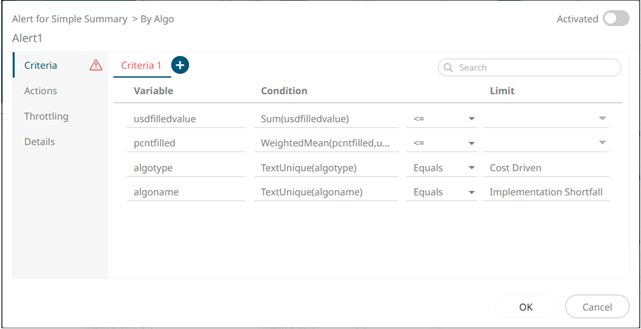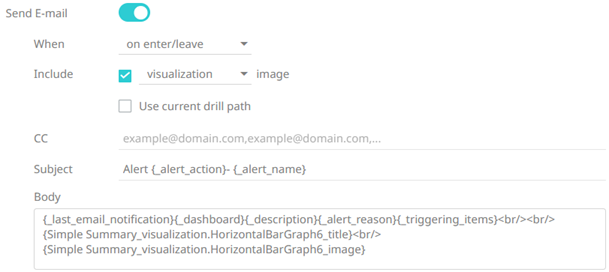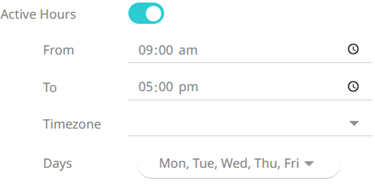Setting Up Alerts on the Web Client
Alerts can be defined against:
- Streaming data sources (including CEP Engines and message queues)
- Periodically refreshed data sources (like Oracle, SAP Sybase, SQL Server, and so on)
Alert definition can be done by right-clicking on a streaming numeric data in a visualization in the Web client and setting the limits, duration, what will be included, how many and when an email will be sent.
To set the alerts:
- Open a workbook on the Web client and right-click on a streaming numeric data in a visualization. Select New Alert in the context menu.

The Alerts dialog displays the name of the visualization where the alert will be set. You can define the alert definition using the four tabs in the dialog: Criteria, Actions, Throttling, and Details.

Sample Text Alerting
Sample Numeric AlertingNOTE: If there are necessary settings missing in the Alerts dialog,
 is displayed and the corresponding section is displayed in red font. Hover on the problematic section to see the cause of the error.
is displayed and the corresponding section is displayed in red font. Hover on the problematic section to see the cause of the error. - The alert name is editable (i.e., Alert1). Double-click and enter a descriptive alert name.
- On the Criteria tab, you can enter or perform the following:
Property
Description
Search
Search for columns.
Criteria
Criteria set of the alert. Can be multiple, in which case all criteria sets are evaluated in parallel, each triggering respective alerts.
Additional criteria sets can be added by clicking
 . You can also right-click a Criteria tab and select Rename to rename the criteria or select Remove to delete. The Remove option is disabled when only one criteria set is available.
. You can also right-click a Criteria tab and select Rename to rename the criteria or select Remove to delete. The Remove option is disabled when only one criteria set is available.Variable
Available variable columns in the visualization where the alert is set.
Condition
Allows setting the following Limit of all the available numeric variables in the visualization:
-
Upper or Equal To (<=)
-
Lower or Equal To (>=)
-
Upper values (<)
-
Lower values (>)
-
Between – values between the Lower and Upper values
For text variables, there are four types of conditions:
-
Equals - The string is equal to another string, e.g., Country=Sweden
-
Not Equals – The string is not equal to another string
-
Wildcard: The string matches a wildcard expression, e.g., Country=Norwa* would match Country=Norway
-
Regex: The string matches a regex expression, e.g., Country=I[a-zA-Z]+a would match Country=India and Country=Indonesia
-
- On the Actions tab, you can specify the following:
Property Description Send E-mail
Tap the slider to update the dialog and display the following settings:

-
When
Determines when an alert email will be sent:
-
On enter
-
On leave
-
On enter/leave
If unchecked, the notification will only be displayed on the Web client.
-
-
Include
Determines whether the image of the visualization or dashboard will be included in the alert email.
For the included image of the visualization, check the Use current drill path box to generate a drilled image in the email.
-
CC
CC mailing groups that will receive the alert, separated by a comma.
-
Subject
The subject of the alert’s email notifications.
-
Body
The content of the alert’s email notifications.
Call Webhook
Tap the slider and select the one or more webhooks that will be executed when the alert is triggered.
Play Sound
Tap the slider and select the sound that will be played for a triggered alert. The available sounds are mp3 files placed in the AppData/Sounds folder. Panopticon is shipped with one sound (i.e., bell_ping_1s.mps). Default is None.
-
- On the Throttling tab, you can specify the following:
Property
Description
For the Last
Checks if a value has reached the limit on the set Date/Time unit:
- second(s)
- minute(s)
- hour(s)
- day(s)
Action Limit (Max)
The maximum number of times an alert will be sent on the set Date/Time unit:
- second
- minute
- hour
- day
Active Hours
Tap the slider to update the dialog and display the following settings:

Determines when an alert should be active. Set the From and To time limits, Timezone, and Days.
NOTE: Once you set the Timezone, the From and To limits will be applied for that time zone. If not set, the server’s default time zone will be used.
- On the Details tab, you can view or specify the following:
Property
Description
Breakdown
Current breakdown of the visualization.
Description
Description of the alert.
Parameters
Available parameters in the visualization.
- Tap the Activated slider to turn it on.
- Click
 . The new alert is added on the Alerts Definition page.
. The new alert is added on the Alerts Definition page.
NOTE: When creating alerts for grand total, ensure that no breakdown is set.
See Working with Alerts for more information.
(c) 2013-2025 Altair Engineering Inc. All Rights Reserved.